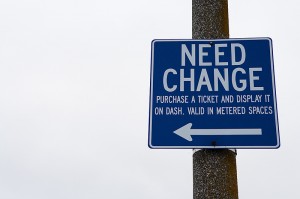 People usually come to therapy wanting to change their lives in some way. It seems logical that if we want change in our lives we have to focus on what we want to change and devote our energy to changing. Why is it, then, that our efforts to change so often fail?
People usually come to therapy wanting to change their lives in some way. It seems logical that if we want change in our lives we have to focus on what we want to change and devote our energy to changing. Why is it, then, that our efforts to change so often fail?
As a Gestalt therapist, I like to use the paradoxical theory of change as a guide in therapy. This theory says that the more we can accept ourselves fully as we are the more possible it is for us to change. Maria Kirschner sums up this idea nicely in her article:
The paradoxical theory of change is one of the fundamental organizing principles in Gestalt therapy, with far-reaching implications. Only by being what and who one is can one become something or someone else. Effort, self-control, or avoidance focused exclusively on the future will not bring about change. We must become our truth (ourselves) first before we can move from it (change). Vice versa, if we try to be different without finding what is true for us, we are following someone else’s truth and will not bring about the long-term change to which we aspire.
All the energy that can get locked up in the battle between trying to change and resisting change can become available for active participation in our life processes. External as well as internal controls interfere with the healthy working of an organism.1
So, if you want to change something about yourself, consider focusing on self-acceptance first:
- If you were fine exactly the way you are right now, what would that mean for you?
- How is the thing you want to change part of one of your good qualities?
- How has the thing you want to change protected you in the past?
- What are the good reasons you developed this way of being in the world in the first place?
- How can you respect yourself the way you are — with all your quirks and flaws and strengths?
The self-talk that goes along with the attitude of self-acceptance can be something like: “I have difficulty getting organized. It’s OK.” or “I feel depressed a lot. It’s OK.” Sometimes you can add, “I wish that things were different, but they are not. This is the way I am.”
All of this can work in relationships also, by the way. The more we can accept our relationships as they are, accept ourselves in relationships, and accept our partners, the more possible it is for the relationship to change.
Some people get very anxious when they imagine accepting themselves exactly as they are because they fear that their lives will always be miserable. If it’s hard for you to accept yourself as you are right now, then try to accept your difficulty accepting yourself: “I would like to be able to accept myself as I am but I’m not able to do that just yet. It’s OK.”
Focusing on self-acceptance is not a quick fix and it’s not something you do once and then you’re done. It is a lifelong practice to accept ourselves as we are. New challenges arise every day for all of us. I do find that when people can stop fighting with themselves all the time they have a lot more energy to do the things they want to do. Try it and see what happens for you.
- Gestalt Therapy Theory: An Overview, http://www.g-gej.org/4-3/theoryoverview.html [↩]
